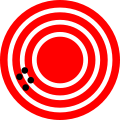Accuracy and precision
| Poetry of reality Science |
| We must know. We will know. |
| A view from the shoulders of giants. |
Accuracy and precision are measurements within science and engineering of how well results fit with reality and how reliable they are. Accuracy is a concept that describes the degree to which a measurement approximates the actual value, whereas precision measures how reproducible a result is.
Low accuracy or precision[edit]
An experiment or test with low accuracy or precision is still useful if the other is reasonably high. A test with low precision can be improved with more samples as each data point will still average out as an accurate value (diagram 1). On the other hand, a test with low accuracy can still be useful if it is precise, because we can conclude that there must be a reproducible and systematic error in the measurement causing the lack of accuracy (diagram 2). In science, this is particularly useful for refining theories and experiments.

